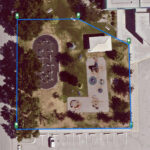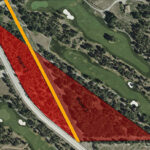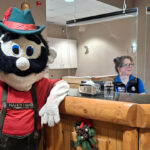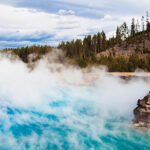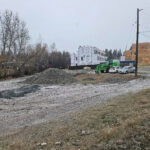Home »

Area G candidates square off in Edgewater forum
By Anne Jardine
On Wednesday evening October 3, the Columbia Valley Chamber of Commerce and the Columbia Valley Pioneer sponsored another in their Election Forum series of community meetings. This event, held at Edgewater Hall, featured the two candidates vying for the Regional District of East Kootenay (RDEK) Electoral Area G Director position, Stephanie Stevens and Gerry Wilkie. Moderator for the meeting was Jim Nielsen.
 Gerry Wilkie, the incumbent Area G Director, and Edgewater resident, introduced himself and explained when he first came on as Area G Director in 2008, he appointed an alternate, rancher Paul Galbraith from the Brisco/Spillimacheen area. “After about three years, Paul didn’t want to do it anymore, so I had to find another alternate. It’s not a very difficult role. The person just has to be available if, for one reason or another, I can’t make it to attend a meeting. I was fortunate that Stephanie agreed to be my alternate, and she has done so ever since. It has been an easy job for both my alternates over the years. In the 10 years since I was first elected, I’ve had perfect attendance – I have not missed a single RDEK board or community meeting. I guess you could say, one of my strengths is I show up.”
Gerry Wilkie, the incumbent Area G Director, and Edgewater resident, introduced himself and explained when he first came on as Area G Director in 2008, he appointed an alternate, rancher Paul Galbraith from the Brisco/Spillimacheen area. “After about three years, Paul didn’t want to do it anymore, so I had to find another alternate. It’s not a very difficult role. The person just has to be available if, for one reason or another, I can’t make it to attend a meeting. I was fortunate that Stephanie agreed to be my alternate, and she has done so ever since. It has been an easy job for both my alternates over the years. In the 10 years since I was first elected, I’ve had perfect attendance – I have not missed a single RDEK board or community meeting. I guess you could say, one of my strengths is I show up.”
“The reason I would like to serve one more term is that one of my major priorities, the redevelopment of the current Post Office and old Credit Union property is still not done. We held community meetings a number of years back and gathered a lot of good ideas, but then other projects, such as the upgrades of the field facilities and the rink came up and those went ahead. So this Post Office property is still important to me and I would like to see it through.”
 For Stephanie Stevens, Area G has been home for most of her life. She has lived in Dry Gulch, Wilmer, Radium Hot Springs (before incorporation it was part of Area G), and now again she lives in Dry Gulch. Stevens has served as a volunteer on many community boards, committees, and projects, especially those that have to do with children and youth. As a young grandmother, she wants to make a better world for future generations. She has the support of her husband and family, as well as her employer.
For Stephanie Stevens, Area G has been home for most of her life. She has lived in Dry Gulch, Wilmer, Radium Hot Springs (before incorporation it was part of Area G), and now again she lives in Dry Gulch. Stevens has served as a volunteer on many community boards, committees, and projects, especially those that have to do with children and youth. As a young grandmother, she wants to make a better world for future generations. She has the support of her husband and family, as well as her employer.
“I have great respect for Gerry and the work he has done in his years as Area G Director,” she said. “But I am running for this position because I think it is the right time for me to step up and offer my perspective and skills. I love Area G. It is one of the best places in the world, and it has some of the best neighbourhoods and communities, and people. I grew up here; I am the person I am because I have lived here in this unique place. It’s time for me to give back. Some of my most important values are words that begin with C: community, communication, and collaboration.”
Moderator Nielsen brought on four questions:
1. Water is essential to life and our most precious resource. How can we keep our rivers and lakes healthy?
Stevens: I think it’s important to draw on the experience and expertise of our local environmental groups to help us formulate policies and bylaws that protect our water systems – Wildsight, the Lake Ambassadors, and wetlands group, and all the other ones.
Wilkie: Environment, all aspects of the environment, and especially water give us our life. Without our environment, we die. Our lakes, rivers and ground water – our entire water resource is crucial, perhaps our most crucial resource. I think that importance will only increase with the pressures of climate change. I agree with Stephanie, and I have volunteered and worked in my role as local government rep with all the regional environmental protection groups.
2. We have had quite a few recent experiences with wildfire. How would you make the region more fire safe? How would you enforce your plan?
Wilkie: It’s not a question of ‘if” but ‘when.’ RDEK has begun to develop a Fire Smart Program for communities. We have a brochure that explains the elements of the program. It is very expensive to create protection around communities – approximately $3,000 per hectare for treatment – to create a fire protection zone.
Stevens: Interface fires happen so fast! We can’t leave a lot of brush around our communities. That’s just asking for trouble. We have to enforce our brush cleanup bylaws. Also we need to have clearly understood evacuation plans.
Wilkie: We have an outstanding emergency response team in RDEK – and an excellent communications system. I’m sure many of you are familiar with our e-mail alerts and daily updates.
3. What’s your vision for the near future? What would your community look like 10 years from now?
Stevens: I have nothing against second homes. I have many friends among the seasonal population. But over the next 10 years, I would like to see more first homes built for year-round families. I realize each community has its own style, its own flavour, yet we are as Area G, one big community. I would like us to retain our rural character. And I would like to see us develop affordable housing. I want that for my family, for my grandchildren, and for everyone’s family into the future.
Wilkie: In 10 years time I see modest growth. I too would encourage long-term residents. We have a good infrastructure, an excellent school in Edgewater, good public services and utilities, roads, and community halls. We can support more growth.
4. What is your view on enforcing bylaws requiring people to clean up their properties?
Wilkie: That’s a tough question. It’s in the eye of the beholder, in a way. But sometimes health and safety or fire hazard issues require immediate attention. More often though, compliance takes time. To work all these things out, I think we need a culture of respect for environment and for our neighbours.
Stevens: I agree voluntary compliance would be great. But In some cases we need a little more teeth. If you’re not going to do it, we’ll send somebody to do it and send you the bill.
Wilkie: That could end up in litigation. Litigation is costly and then it takes a lot more time.
The following four questions were submitted by the audience.
5. In Brisco, we have seen issues of dangerous highway congestion on Hwy 95, especially during the summer. The same is probably true in Spilli too. Is there anything that our Area G Director can do towards widening the highway?
Stevens: I don’t know if RDEK has any jurisdiction or influence. It’s the Ministry of Transportation and Infrastructure, but we may be able to help in communication.
Wilkie: They work on places deemed to be priorities. We need to make sure Brisco gets on the priority list. I’ll get on the phone and see what I can do.
6. Mobile Home Parks?
Wilkie: Affordable housing is right at the top of the list for Area G residents, and really, for the whole of the RDEK. We need to identify locations where mobile, and/or modular homes would fit in, and work with appropriate zoning, etc.
Stevens: This is a bit of a sore point with me. I think small homes, ‘tiny homes,’ mobile and modular homes are fine. They may be the only way some people can ever own a home of their own. Personally, I grew up in a trailer. It worked out just fine. I wouldn’t mind if my son and grandkids were able to buy a nice trailer with a little yard. There is an unfortunate perception that mobile home residents are ‘bad people.’ And we have to stop saying that affordable housing is such a tough nut to crack. We can create affordable housing. We just need to get down to it.
7. Does either candidate support access to the river?
Stevens: I wouldn’t want to see too much development, but I do think there should be simple public wharfs, and launch /landing sites here and there at appropriate places.
Wilkie: In conjunction with the Columbia Wetlands Stewardship Group, we have just completed a study to map the possible sites with plans for waste containers and perhaps even simple washroom facilities. Once the map is released, more consultation will have to follow. I think over the next couple of years we will be able to move ahead on this.
8. A drastic event happened with the Edgewater Fire Department. How can trust be rebuilt again?
Wilkie: I am very supportive of the volunteers, the recruitment of new volunteers, and the introduction of a new benefits package. I think the fire department is back up now to where it has been, in terms of numbers of members, and it’s beginning to grow. It is important to keep working with the community to keep that trend going.
Stevens: I don’t know the details of exactly what happened, but as the Area G Director, I would attempt to restore trust in these ways: show up, listen, try to work through the issues.
e-KNOW
